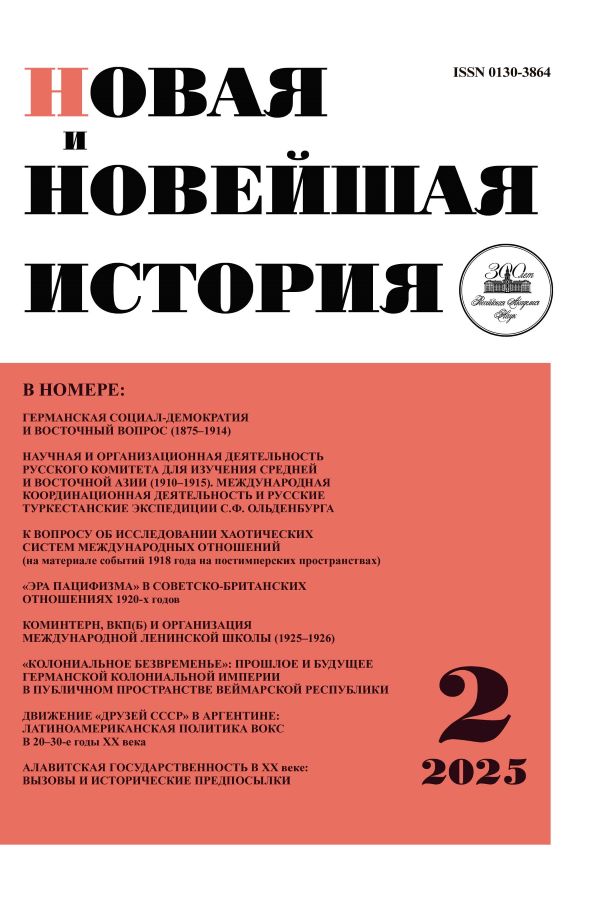Colonial timelessness: The past and future of the German colonial empire in the public discourse of the Weimar Republic
- Autores: Rodin D.V.1
-
Afiliações:
- Lomonosov Moscow State University
- Edição: Nº 2 (2025)
- Páginas: 19-30
- Seção: Theory and methodology of history
- URL: https://transsyst.ru/0130-3864/article/view/682987
- DOI: https://doi.org/10.31857/S0130386425020023
- ID: 682987
Citar
Texto integral
Resumo
Throughout the Weimar Republic’s existence, public discourse frequently engaged with the colonial experience and the prospects for restoring Germany’s overseas empire. A relatively understudied aspect of these discussions is the temporal perception of the concept of the “colonial empire”, which provides insight into how the politically active segments of the population viewed both the colonial legacy of the Second Reich and the young republic’s foreign policy efforts to revise the Treaty of Versailles. This article examines the “chronotope” of the colonial empire in the writings of key figures involved in post-colonial debates in the Weimar Republic, exploring how this concept was situated on the mental chronological scale of German public discourse. An analysis of the works of leading colonial-revisionist figures – Heinrich Schnee, Theodor Seitz, Emil Brückner, and Johannes Schacht – along with publications by the German Colonial Society and materials from the 1924 Colonial Congress, reveals a duality in the temporal perception of Germany’s colonial empire. It was simultaneously framed as an idealised past, deployed to counter the Allied-imposed thesis of Germany’s “colonial guilt”, and as a future aspiration, reflecting the Weimar Republic’s political elite’s readiness to campaign – primarily through diplomacy – for the restitution of lost overseas territories. At the same time, two distinct factions emerged among proponents of colonial restoration: “unitarians”, who advocated for the re-establishment of the Second Reich’s colonial empire by reclaiming the territories lost under the Treaty of Versailles, and “federalists”, who favoured neocolonial strategies of economic and cultural penetration into Germany’s former overseas possessions. Despite their differences, both groups perceived the Weimar Republic as a period “of colonial timelessness” – a state of stagnation that had to be overcome. This perception, in turn, undermined the legitimacy of the young republic and contributed to its eventual collapse in the early 1930s.
Texto integral
Sobre autores
Denis Rodin
Lomonosov Moscow State University
Autor responsável pela correspondência
Email: enigma9307@mail.ru
ORCID ID: 0009-0002-5378-5342
Scopus Author ID: 57951433900
Researcher ID: 10283531
кандидат исторических наук, научный сотрудник
Rússia, MoscowBibliografia
- Киссинджер Г. Дипломатия. М., 2018.
- Родин Д.В. Колониальный вопрос во внешней политике Веймарской республики // Закат на Востоке. От начала к концу Версальско-Вашингтонской системы. М., 2023. С. 181–201.
- Фокин С.В. Геополитическое измерение колониальной политики Германии. М., 2005.
- Фокин С.В. «Дранг нах Африка»: колониальная политика Германии (конец XIX – 30-е годы XX века). М., 2003.
- Хаусхофер К. О геополитике: работы разных лет. М., 2016.
- Fokin S.V. “Drang nakh Afrika”: kolonial’naya politika Germanii (konets XIX – 30-e gody XX veka) [“Drang nah Africa”: the colonial policy of Germany (late 19th – 30s of the 20th century)]. Moskva, 2003. (In Russ.)
- Fokin S.V. Geopoliticheskoe izmerenie kolonial’noj politiki Germanii [The Geopolitical dimension of Germany’s Colonial Policy]. Moskva, 2005. (In Russ.)
- Khauskhofer K. O geopolitike: raboty raznykh let [About geopolitics: works from different years]. Moskva, 2016. (In Russ.)
- Kissindzher G. Diplomatiya [Diplomacy]. Moskva, 2018. (In Russ.)
- Rodin D.V. Kolonial’nyj vopros vo vneshnej politike Vejmarskoj respubliki [The colonial question in the foreign policy of the Weimar Republic] // Zakat na Vostoke. Ot nachala k kontsu Versal’sko-Vashingtonskoj sistemy [Sunset in the East. From the beginning to the end of the Versailles-Washington system]. Moskva, 2023. S. 181–201. (In Russ.)
- Bechhaus-Gerst M. “Nie liebt eine Mutter ihr Kind mehr, als wenn es krank ist”. Der Kolonialrevisionismus (1919–1943) // Deutschland Postkolonial? Die Gegenwart der imperialen Vergangenheit. Berlin, 2018. S. 101–122.
- Beer G.L. African Question at the Paris Peace Conference with Papers on Egypt, Mesopotamia, and the Colonial Settlement. New York, 1923.
- Deutsche Kolonialpolitik in Dokumenten. Gedanken und Gestalten aus den letzten fünfzig Jahren. Leipzig, 1938.
- Deutschland braucht Kolonien! Berlin: Deutsche Volksgemeinschaft, 1925.
- Dix A. Weltkrise und Kolonialpolitik. Die Zukunft zweier Erdteile. Berlin, 1932.
- Esche J. Koloniales Anspruchdenken in Deutschland 1914–1933. Hamburg, 1989.
- Heyn S. Der kolonialkritische Diskurs der Weimarer Friedensbewegung zwischen Antikolonialismus und Kulturmission // Stichproben. Wiener Zeitschrift für kritische Afrikastudien. 2005. № 9. Jg. 5. S. 37–65.
- Laak D. van. “Ist je ein Reich, das es nicht gab, so gut verwaltet worden?” Der imaginäre Ausbau der imperialen Infrastruktur in Deutschland nach 1918 // Phantasiereiche. Zur Kulturgeschichte des deutschen Kolonialismus. Frankfurt, 2003. S. 71–90.
- Laak D. van. Imperiale Infrastruktur: Deutsche Planungen für eine Erschließung Afrikas 1880 bis 1960. München, 2004.
- Pedersen S. The Guardians: The League of Nations and the Crisis of Empire. New York, 2017.
- Poley J. Decolonization in Germany: Weimar Narratives of Colonial Loss and Foreign Occupation. Bern, 2005.
- Rüger A. Der Kolonialrevisionismus der Weimarer Republik // Drang nach Afrika. Die koloniale Expansionspolitik und Herrschaft des deutschen Imperialismus in Afrika von den Anfängen bis zum Ende des Zweiten Weltkrieges. Berlin, 1977. S. 243–280.
- Salesse Ch. Le Probleme Colonial Allemand. Paris, 1931.
- Schippel M. Die Schicksalsstunde der deutschen Kolonien // Sozialdemokratie und Kolonien. Berlin, 1919. S. 9–11.
- Schmokel W.W. Dream of Empire: German Colonialism 1919–1945. New Haven; London, 1964.
- Schnee H. Deutsch-Ostafrika im Weltkriege: Wie wir lebten und kämpften. Leipzig, 1919.
- Schnee H. German Colonization Past and Future: The Truth about the German Colonies. London, 1926.
- Solf W.H. Germany’s Right to Recover Her Colonies. Irrefutable Facts and Figures, English and American Testimony. Berlin, 1919.
- Steiner Z. The Lights That Failed: European International History 1919–1933. New York, 2007.
- Verhandlungen des Deutschen Kolonialkongresses 1924 zu Berlin am 17. Und 18. September 1924. Berlin, 1924.
- Wempe S.A. Revenants of the German Empire: Colonial Germans, Imperialism, and the League of Nations. New York, 2019.
- Wright J. Gustav Stresemann: Weimar’s Greatest Statesman. New York, 2002.
Arquivos suplementares










